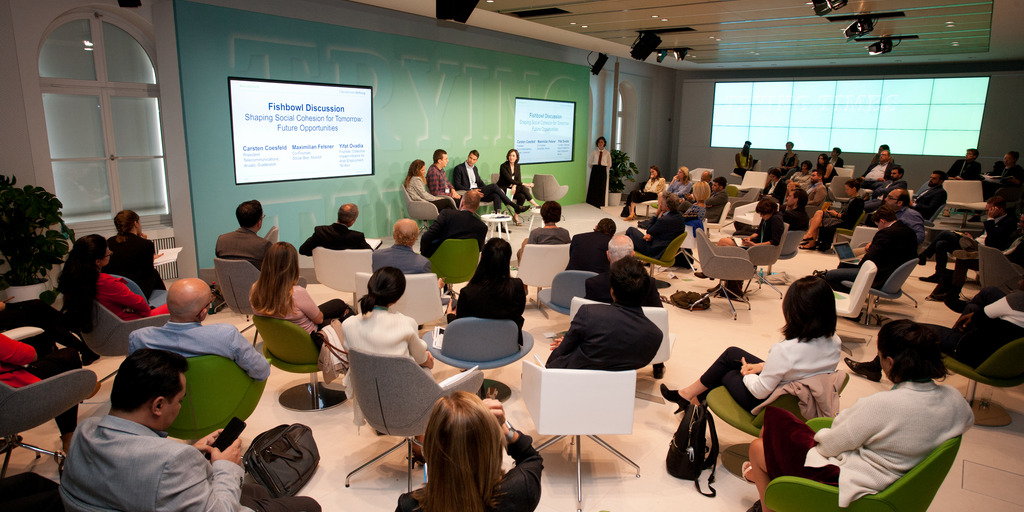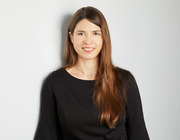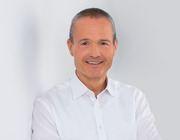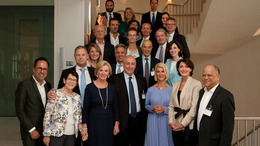The conference was launched by a roundtable discussion led by Liz Mohn, Vice-Chairwoman of the Bertelsmann Stiftung Executive Board, on September 4. Ian Goldin, leading globalization expert at Oxford University, opened the day with his keynote speech “Globalisation, Transformation and Social Cohesion.” Twenty-five thought leaders in politics, business, society, media and culture then discussed the key challenges to the future of social cohesion that are brought on by the dynamics of globalization, digitalization and demographic change. The challenges discussed included socioeconomic inequalities, increasing social isolation and the growing rate of loneliness among people in many societies, as well as the ever-increasing pace of social change. In her welcoming speech, Liz Mohn summed up the problems we face:

© Thomas Kunsch
Trying Times 2019: Rethinking Social Cohesion
Social cohesion is essential to creating communities that enable an inclusive sense of belonging. The megatrends of globalization, digitalization and demographic change pose challenges to the cohesion that has proved essential to communities around the world. The “Trying Times – Rethinking Social Cohesion” conference held in Berlin September 4-6, 2019 provided a forum for some 80 participants from 22 countries to network as they share their experiences with social cohesion and learn from each other.
Content
We know what we had to deal with ten years ago, but we don’t know what’s coming tomorrow. Many people are worried about the future and seek security.
Liz Mohn, Vice-Chairwoman of the Bertelsmann Stiftung Executive Board
In the spirit of the motto “Learning from the world,” former president of Kosovo, Atifete Jahjaga, drew on her country’s experiences in making recommendations on how to strengthen social cohesion. She mentioned, for example, the importance of guaranteeing equal opportunities, accepting diversity and the need for an awareness of the fact that one’s own community is tied to developments in other parts of the world.
Ample opportunity for intensive exchange and in-depth discussion
On September 5-6, the discussion continued in an extended circle of around 80 participants from 22 countries within the framework of a production conference, which included various interactive formats that were supported by digital tools. Aart De Geus, Chairman and CEO of the Bertelsmann Stiftung, emphasized in his opening speech: “Social cohesion is not just ‘nice to have.’ It’s the glue that holds society together.” Thanks to the alternation between plenary sessions and breakout sessions, the conference facilitated intensive discussions and gave participants ample opportunity to exchange their views and experiences with each other.
At two separate panels, the broader trends and challenges as well as opportunities and perspectives in politics, business and society regarding the future of social cohesion were discussed. In addition, the breakout sessions provided participants the opportunity to engage in-depth with each other on more specific aspects of the conference theme. For example, Jörg Dräger, member of the Bertelsmann Stiftung Executive Board, presented in his breakout session “Algorithms and Human Benefit” how algorithms can be leveraged to benefit the broader public. Further sessions dealt with topics such as “Public Spirit and Citizenship,” “Solidarity in a Global Economy,” “Diversity in Local Communities” or “The Workplace as Social Space.”
Networking as a key goal
A key objective of the conference was to promote networking and cooperation among the participants, which Board Member Brigitte Mohn emphasized in her speech at the start of the final day of the conference by calling on the participants to: “Open your networks and work across all sectors!”
The conference delivered several takeaways such as the need to focus on shaping social cohesion at the local level and create lively public spaces for communities, as well as the importance of ensuring that economic opportunities go hand in hand with an inclusive vision of society and finally, the need to proactively harness and regulate new technologies and the opportunities brought on by digitalization.
The results of the conference will be incorporated into the Bertelsmann Stiftung's project work and serve as a foundation for further exchange with an international network of experts and practitioners.
Speakers at the conference
Roundtable:
- Prof. Ian Goldin, Professor of Globalisation and Development and Director, Oxford Martin Programme on Technological and Economic Change, University of Oxford
- Atifete Jahjaga, former President of the Republic of Kosovo, Pristina
- Liz Mohn, Vice-Chairwoman of the Executive Board, Bertelsmann Stiftung, Gütersloh
Production conference:
- Prof. Dr. Heinz Bude, Professor of Macrosociology, University of Kassel
- Mete Coban, Chief Executive, My Life My Say, London
- Carsten Coesfeld, President Telecommunications, Arvato, Gütersloh
- Daniel Cronin, Venture Partner, Founders Lane, Vienna
- Aart De Geus, Chairman and CEO, Bertelsmann Stiftung, Gütersloh
- Dr. Jörg Dräger, Member of the Executive Board, Bertelsmann Stiftung, Gütersloh
- Maximilian Felsner, Co-Founder Social-Bee, Munich
- Jenny Gallagher, Founder, Help-Full, Oakland
- Georgia Gould, Leader of the Council, Camden Council, London
- Dr. Anatol Itten, Managing Director, Disrupted Society Institute (DISI), Amsterdam
- Bilkay Kadem, Member of the Management Board of Landesbetrieb für Gebäudebewirtschaftung, Part B – Refugee Accommodations, Berlin
- Johannes Kleske, Managing Director, Third Wave, Berlin
- Dr. Brigitte Mohn, Member of the Executive Board, Bertelsmann Stiftung, Gütersloh
- Prof. Yascha Mounk, Associate Professor, Johns Hopkins University, Baltimore
- Anisah Osman Britton, Founder, 23 Code Street, London
- Yifat Ovadia, Founder, Collective Impact Partnership for Arab Employment, Netanya
- John Ralston Saul, President Emeritus, PEN International, Toronto
- Thomas Schindler, Founder, delodi, Berlin
- Arrizu Sirjani, Know Your Rights Project Coordinator, NYC Mayor’s Office of Immigrant Affairs, New York
- Xifan Yang, China correspondent, DIE ZEIT, Beijing
Moderation: Sarah Kelly, TV News Anchor & Journalist, Berlin






